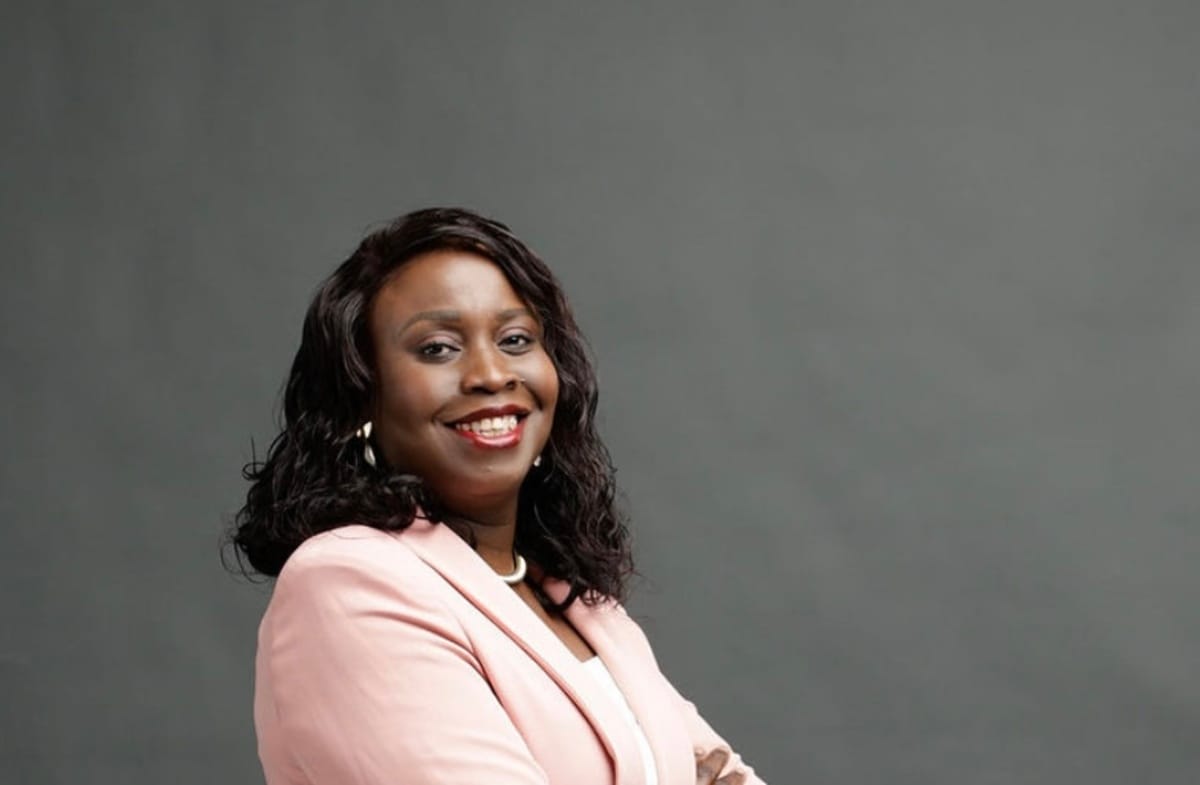THE DISRUPTION
Reflections from Makerere University: AI, Elections, and Trust in African Journalism

Me at Makerere
Last week, I returned to Makerere University, the place where my journalism journey began 25 years ago. This time, I was there as a keynote speaker discussing how AI is changing election reporting in Uganda.
It was a timely conversation because Uganda is going to the polls in January 2026, and most young Ugandans are already engaging with politics on their phones.
For many, TikTok, WhatsApp, and YouTube have replaced the evening news. That's where they are getting their information.
The challenge is that AI is now part of that world, speeding up news production and also fuelling misinformation, deepfakes and propaganda. We’ve had three elections in Africa in the last few days - Ivory Coast, Cameroon and Tanzania.
So we explored what responsible journalism and innovation look like in this new landscape, as newsrooms try to serve an increasingly digital audience.
For me, it comes down to the basics: being transparent about how you use technology, keeping human editors in control, and auditing tools for bias, and above all, protecting trust, because trust remains journalism's strongest currency.
These principles are timeless, even as the tools and technology evolve. This tension between speed and integrity is exactly what this edition explores. Our Innovation in Action feature spotlights ChatJourno, a Lagos-based startup helping reporters find verified background information in seconds.
In this edition, following your feedback, we are also experimenting with AI summaries. “At a Glance” will give you a snapshot of our “Innovation in Action” section.
And if you're figuring out your own path through this landscape, check out the Opportunities Board for new fellowships, training programs, grants and others.
INNOVATION IN ACTION
The Lagos startup teaching AI to understand journalism
ChatJourno started out as a solution to newsroom chaos. Today, it’s helping reporters across Africa move fast without losing their grip on accuracy.
AT A GLANCE
From Lagos, Nigeria
The story: Ayomikunle Daramola and his team have created a tool that helps journalists find verified background information and context in seconds.
The innovation: The story retrieval and summarisation tool, ChatJourno, is trained on trusted news archives, giving reporters instant access to credible context while keeping editorial judgment firmly in the journalists’ hands.
Why it matters: This innovation addresses one of journalism’s biggest challenges; delivering fast reporting without compromising accuracy.
See how they did it.👇🏾

ChatJourno’s Ayomikunle Daramola
ChatJourno and the Race for Credible Speed
Journalists everywhere know the feeling. The newsroom clock never stops. You’re filing fast, fact-checking faster, trying to stay accurate while ten other outlets chase the same story.
For Ayomikunle Daramola, Co-founder and Product Director of ChatJourno, that daily tension was the problem worth solving. “Journalists today work in extremely fast-paced environments,” he says. “You have to deliver stories in real time, and your facts must be cross-checked — all while maintaining accuracy and ethics.”
He’d watched colleagues lose precious time bouncing between Google, old CMS archives, and WhatsApp chats just to find background. “Fifteen minutes may not sound like much,” he says, “but in a breaking-news moment, that’s the difference between leading the story and playing catch-up.”
That’s how ChatJourno was born. The newsroom tool pulls credible stories from trusted sources, helping reporters verify facts, find context, and publish confidently.
From Idea to Tool
ChatJourno can be described as a shortcut to the newsroom’s archives because it gives journalists instant access to their newsroom’s institutional memory. “A journalist using ChatJourno can instantly access relevant, credible reports to enrich and fact-check their stories,” Ayomikunle explains.
It currently offers two main features. The first, the Story Retriever and Summarisation Tool, lets reporters recall past stories by topic or beat — politics, climate, business, or education — and use them as context for new coverage. The second, the Chatbot, acts as a writing companion: helping to redraft, tighten, or fact-check copy, and even pull summaries from verified news archives.
Together, they cut down the time journalists spend switching between tabs and chasing background information — a small but crucial win for speed and accuracy.
Guardrails by Design
The goal was never about chasing speed for its own sake, but about maintaining credibility.
From the start, Ayomikunle’s team made a deliberate decision not to scrape random corners of the internet. “We wanted ChatJourno to be trained on credible sources,” he says. That’s how they built a partnership with TheCable, one of Nigeria’s most trusted digital outlets, giving ChatJourno access to more than 180,000 fact-checked stories and a steady feed of updates.
The system uses Retrieval-Augmented Generation (RAG), which means it doesn’t guess or fabricate answers. Instead, it retrieves real information from verified databases, with links back to original publishers.
“If ChatJourno doesn’t have the data, it tells you so,” Ayomikunle says. “Transparency builds trust.” He adds.
Every result cites its source, allowing journalists to see where information comes from and decide how to use it. In this business, you have to know where every fact comes from.
Winning Over Skeptics
Like with every newsroom innovation, the real challenge was getting people to trust the technology.
“Some newsroom leaders were skeptical,” Ayomikunle admits. “They worried that AI tools would replace journalists.”
So his team brought reporters into the process from day one. Working with the Center for Journalism Innovation and Development (CJID), they paired engineers and journalists to build together. They also surveyed 36 reporters across 10 newsrooms; including The Guardian, Nairametrics, and Premium Times, to find out what really slowed them down.
“The collaboration between engineers and journalists shaped the foundation of ChatJourno,” he says.
When TheCable agreed to pilot the tool, 30 reporters tested it in live conditions. The feedback was overwhelmingly positive. During one upgrade, when the system briefly went offline, reporters started calling the developers. “They said, ‘Your tool is down and we can’t work without it,’” Ayomikunle recalls. “That was powerful. It showed us how much journalists were relying on it.”
Impact in the Newsroom
In four months of testing, more than 600 users generated over 1,000 sessions on ChatJourno. The gains were clear.
“A reporter can now break a story and instantly publish a fact-check tweet alongside it,” Daramola says. “Before, that could take hours or even days.”
Editors now have visibility, too. They can see which stories are gaining traction, which reporters are publishing most frequently, and where to focus follow-ups.
This combination of recall, writing support, and analytics is turning ChatJourno into what Ayomikunle calls “a news intelligence system” - a workspace that speeds up journalism without cutting corners.
A Mindset Shift
Does he worry about this tool making journalists lazy? “No AI won’t make journalists lazy,” he says. It will only make lazy journalists lazier. But for those who are already diligent, it’s a productivity boost.”
By taking over repetitive tasks like translation and SEO rewriting, ChatJourno gives journalists space to think, question, and go deeper. “The tools handle routine tasks,” he says. “Journalists still handle context, judgment, and ethics.”
For African media houses stretched between shrinking revenue and growing demand, efficiency has become the difference between keeping the lights on and shutting down. “When grants dry up, many outlets have to cut operations,” he says. “But with the right tools, a reporter who once spent 30 minutes writing a story can now do it in 15, without losing quality.”
Building for Africa’s Newsrooms
Ayomikunle sees ChatJourno as part of a larger movement to make African journalism faster, safer, and more sustainable. “Our long-term goal is to build a continental network of verified journalism data,” he says. “If a reporter in Lagos wants background on Kenya–Nigeria relations, they should get that from credible African sources, not random social media posts.”
Partnerships with outlets across the continent are already underway, supported by CJID. The team is also building new integrations from WordPress plugins to feedback systems that let journalists rate responses and improve the model over time.
Looking ahead, he wants journalists to be rewarded for that work. “If they’re helping us refine the model and strengthen the knowledge base,” he says, “they should benefit from that contribution.”
The Big Lesson
Asked what advice he has for editors still unsure about AI, Daramola is clear. “Start with your ethics manual,” he says. “Automate what you can, but keep human checkpoints. Technology should serve journalism, not replace it.”
And for smaller newsrooms, his message is practical: don’t build from scratch, collaborate. “Media tech startups like ours exist so journalists can focus on storytelling while we handle the engineering.”
For him, this balance between technology and human judgment is the real innovation.
“We wanted journalists to feel that when they used ChatJourno, they were in a familiar, safe space built for their work,” he says. “That’s still our guiding principle.”
🚀OPPORTUNITIES WORTH KNOWING
The good stuff: upcoming events, grants, training programs, jobs, and more
▶ 📢 Grant Opportunity for Investigative Journalists
Stringer Journalism \(@anjansun\) is offering support for investigative reporting.
🗓️ Deadline: December 31, 2025.
Apply here 👉https://stringerjournalism.org/apply-for-grants
▶ 🎬 Africa’s next wave of storytellers — are you in?
The Solutions Storytelling Project (SSP) is back for Season Four (2026) — and we’re looking for 15 bold African filmmakers (born & based) to join us in creating solutions-driven short documentaries. 🎬✨. SSP os brought to you by The Video Consortium with support from Skoll Foundation
Filmmakers this is your chance to:
✅ Partner with inspiring nonprofits
✅ Receive mentorship + resources
✅ Share your work on a global stage 🌍
Our SSP films have won Telly Awards, screened at major festivals, and been featured by AJ+ and Scientific American. Now it’s YOUR turn.
📅 Deadline: November 30, 2025
👉 Apply now: https://lnkd.in/dW7Ja5SF
▶ DW Traineeship 2027-2028: Applications open
The application phase for the 2027-2028 DW traineeship has started. Aspiring journalists can apply for the bilingual program until November 17.
This Issue Brought to You By Reebo Consult
We work with media organisations to turn big ideas into real impact — integrating AI, navigating digital shifts, and rethinking editorial strategy for the future. Curious about what that could look like for you? Let’s connect. Send me an email.
The AI Insights Every Decision Maker Needs
You control budgets, manage pipelines, and make decisions, but you still have trouble keeping up with everything going on in AI. If that sounds like you, don’t worry, you’re not alone – and The Deep View is here to help.
This free, 5-minute-long daily newsletter covers everything you need to know about AI. The biggest developments, the most pressing issues, and how companies from Google and Meta to the hottest startups are using it to reshape their businesses… it’s all broken down for you each and every morning into easy-to-digest snippets.
If you want to up your AI knowledge and stay on the forefront of the industry, you can subscribe to The Deep View right here (it’s free!).
Help us keep sharing real stories
▶ Know someone who’d love this? Forward it their way.
▶ Was this email forwarded to you?

